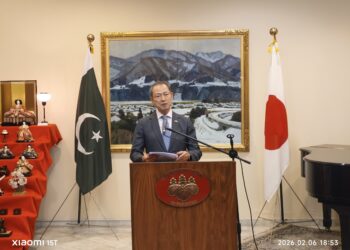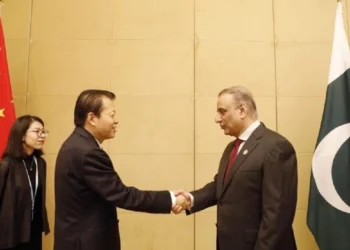ISLAMABAD; Shortly after receiving the approval of the federal cabinet, the government tabled the draft of the 27th Constitutional Amendment Bill in the Senate on Saturday, and the Senate Chairman immediately referred it to the Standing Committee on Law & Justice (and likewise the National Assembly’s counterpart) for review.
A joint session of both the Senate and National Assembly law committees was summoned for 2 pm to examine the amendment in detail.
During the session, however, two members of the Jamiat Ulema‑e‑Islam (F) (JUI-F) – Ms. Aliya Kamran and Senator Kamran Murtaza – chose to boycott the proceedings.
Their stated reason: that the draft resurrects amendments which had been set aside during work on the 26th Amendment bill. After deliberations, the two committees adjourned the meeting until Sunday for further discussion.
Speaking to the media after adjournment, Law Minister Azam Nazeer Tarar said that all parties were participating in the process, and that the government had also requested opposition participation.
He specifically pointed out that while Aliya Kamran had informed the committee that her party’s instructions prevented attendance, all other parties were present. According to Tarar, the proposed amendment has been under discussion for the past decade to decade-and-a-half.
He noted that during the time of the 18th Amendment and later during the 26th Amendment efforts, the idea of major structural reform had been on the agenda but was delayed for various reasons, including suggestions by Maulana Fazlur Rehman that less sweeping transitions be pursued instead of wholesale change.
Tarar explained that the creation of constitutional benches had increased the workload for the judiciary, because the same judges heard both bench matters and regular case work.
He said one of the objectives of the new amendment is to reduce the backlog of cases and to end the criticism of a “court within a court”. He stated that about 60 per cent of clauses in the draft had already been argued and reviewed, and that the sessions will reconvene at 11 am tomorrow morning. “We will continue our discussions until consensus is reached by all members of both Houses,” he added.
Senator Farooq H. Naek, chairing the Senate law committee, told journalists that no final decision has yet been reached, though approximately 80 per cent of the bill’s substance has been discussed.
He added that some “mistakes” in the draft are being corrected, and the law ministry has been informed. On the question of proposed changes to Article 243, he noted that those amendments were not considered during the session.
On the Senate floor, Tarar formally moved the bill, requesting that the question hour and other business be suspended so that the committee referral process could begin.
During the debate, a member of Pakistan Tehreek‑e‑Insaf (PTI), Mr. Ali Zafar, argued that it was inappropriate to debate the amendment when the Leader of the Opposition’s seat remained vacant. He suggested that instead of committee referral, the entire Senate serve as the committee, since the opposition had only just received the draft and had not yet had time to review it. He insisted, “We cannot debate something we have not read.”
The draft bill presented by the ministry covers wide-ranging reforms including the establishment of a Federal Constitutional Court (FCC), modifications in the appointment process of high court judges and transfer mechanisms, changes to thresholds for provincial cabinets, restructuring of military leadership and command, and other structural adjustments.
Tarar said that consultations with coalition partners and provinces have been ongoing, and in many ways the bill is the culmination of long-standing reform ideas.
The government, according to sources, laid emphasis on five major subject-areas: judicial restructuring (including the constitutional court), transfer of judges and related safeguards, armed forces command reforms (via Article 243 adjustments), provincial-federal fiscal and policy arrangements, and local government/federal subjects.
Tarar emphasised that the goal is to enable the ordinary citizen to receive relief quicker, reduce backlogs and make the system more efficient.
The Prime Minister’s office confirmed that the cabinet meeting was chaired by Shehbaz Sharif (via video link from Azerbaijan) where the bill draft was approved and the work to secure a two-thirds majority in Parliament was acknowledged.
The premier thanked coalition partners including the Pakistan Peoples Party (PPP), Muttahida Qaumi Movement‑Pakistan (MQM-P), and others. He stressed that strengthening the federation, the provinces and the national interest together required this reform package.
However, critics — especially legal experts and opposition figures — have raised concerns that the amendments could weaken provincial autonomy (enacted under the 18th Amendment) and judicial independence.
Some warn that control over key appointments and transfers could shift excessive power toward the executive and military. As one analysis put it: the amendment may formally replace rule of law with a model of rule by law.
The PPP has drawn a red line particularly against any change to provincial shares under the NFC award, although it has indicated conditional support for defence-command changes under Article 243. The MQM-P has pushed for strong local governments and has made its own amendment proposals linked to Article 140A.
As of now the standing committees will reconvene on Sunday, 9 November; discussions will continue until consensus is found among all stakeholders, the law minister said. The coming days are likely to show whether the government can secure full parliamentary endorsement and overcome objections from smaller parties and the opposition.




































































